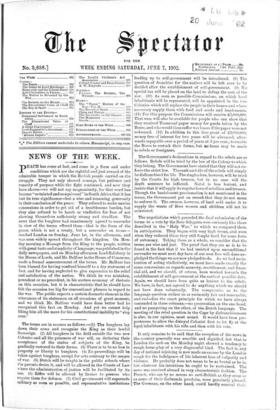The negotiations which preceded the final submission of the terms
to a vote by the Boer delegates were curiously like those described in the " Holy War," to which we compared them in anticipation. They began with very high terms, and even when they reduced them they still fought hard for some form of autonomy. Taking them as a whole, we consider that the terms are wise and just. The proof that they are so is to be found in the fact that if we had insisted upon unconditional surrender we must next day have of our own free will done un- pledged the things we are now pledged to do. As we bad, no in- tention of acting vindictively, we must have made exactly the same concessions as regards amnesty, resettlement, and finan- cial aid, and we should, of cdurse, have worked towards the establishment of self-government at the earliest possible date. Again, we should have been quite as lenient to the rebels. We have, in fact, not agreed to do anything which we should not have done voluntarily. The compromise as to the language question strikes us as eminently fair and reasonable, and embodies the exact principle for which we have always contended in these columns,—no persecution on the one hand, and no pampering on the other, of the Dutch language. The meeting of the rebel question in the Cape by disfranchisement is also, in our opinion, most sound. It would have been pre- posterous to allow the disloyal Colonist first to let fly at the loyal inhabitants with his rifle and then with his rote.






































